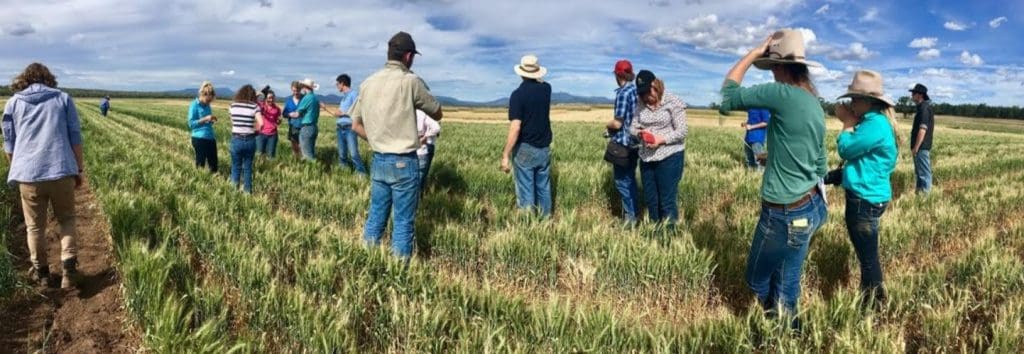Agricultural Education And Training For Rural Communities
 |
| agricultural education farmers training colleges future traditional there budding preferred residential option based much young which model |
Agricultural education has been a vital part of our society for centuries. It has played a significant role in shaping our agricultural practices and ensuring food security. However, in recent years, there has been a growing debate about the future of traditional agricultural colleges. With advancements in technology and changing agricultural practices, many are questioning the relevance and sustainability of these institutions in the modern world.
As we move towards a more technologically advanced agricultural sector, the need for highly skilled professionals in areas such as robotics, precision farming, and data analysis is increasing. This has led some to argue that traditional agricultural colleges may not be adequately preparing students for the challenges and opportunities of the future.
However, it is crucial to recognize the value and importance of traditional agricultural education. These institutions have a long history of imparting knowledge and skills that form the foundation of our agricultural industry. They provide a comprehensive understanding of the principles and practices of agriculture, covering areas such as soil science, plant breeding, livestock management, and agricultural economics.
What is the future of traditional agricultural colleges? Are they still relevant in today's rapidly evolving agricultural landscape? Let's explore some of the ideas and recommendations for the future of agricultural education.
What is the future of traditional agricultural colleges?
The future of traditional agricultural colleges lies in their ability to adapt to the changing needs of the industry. While there is a growing demand for specialized skills in areas like agtech and sustainability, traditional agricultural colleges can still play a crucial role in providing a strong foundation in core agricultural principles.
By incorporating new technologies and practices into their curricula, traditional agricultural colleges can ensure that their graduates are well-equipped to tackle the challenges of the future. This may involve integrating courses on precision agriculture, remote sensing, and data analytics, as well as fostering innovation and entrepreneurship among students.
Ideas For the Future of Traditional Agricultural Colleges
1. Collaboration with Industry: Traditional agricultural colleges can forge strong partnerships with industry stakeholders to develop relevant and practical curriculum. This collaboration can help ensure that students are exposed to the latest advancements and industry trends.
2. Emphasizing Sustainability: As sustainable farming practices gain traction, traditional agricultural colleges can integrate courses on ecological farming, organic production, and environmental stewardship. This will prepare students for a future where sustainability is paramount.
3. Promoting Innovation: In today's rapidly changing agricultural landscape, innovation is key. Traditional agricultural colleges can foster a culture of innovation by providing students with opportunities to engage in research and development projects, and by supporting entrepreneurial ventures.
Recommendations For the Future of Traditional Agricultural Colleges
1. Diversification of Programs: To cater to the evolving needs of the industry, traditional agricultural colleges should consider diversifying their program offerings. This may involve introducing specialized programs in areas like agribusiness management, precision agriculture, and agricultural engineering.
2. Enhancing Practical Training: Hands-on experience is essential in agricultural education. Traditional agricultural colleges can enhance practical training opportunities by establishing partnerships with local farms, research institutions, and agricultural businesses. This will allow students to apply their theoretical knowledge in real-world settings.
3. Engaging the Next Generation: To ensure the future of traditional agricultural colleges, it is crucial to engage and attract the next generation of students. This can be achieved by promoting the diverse career opportunities in the agricultural sector, highlighting the potential for innovation and technological advancements, and addressing misconceptions about the industry.
Listicle of Reasons Why Traditional Agricultural Colleges Are Still Relevant
1. Strong Foundation: Traditional agricultural colleges provide students with a strong foundation in core agricultural principles and practices. This knowledge forms the basis for further specialization and helps students adapt to new technologies and practices.
2. Practical Skills: Agricultural education goes beyond theoretical knowledge. Traditional agricultural colleges emphasize practical skills and hands-on experience, preparing students for the realities of the industry.
3. Networking Opportunities: Traditional agricultural colleges provide excellent networking opportunities, allowing students to connect with industry professionals, researchers, and fellow students. These connections can be invaluable for career development and future collaborations.
Question & Answer: Frequently Asked Questions About Traditional Agricultural Colleges
1. Are traditional agricultural colleges becoming outdated?
While the agricultural industry is evolving, traditional agricultural colleges still have a crucial role to play. By adapting their curricula and incorporating new technologies, these institutions can remain relevant and ensure that graduates are well-prepared for the future.
2. What are some emerging areas in agricultural education?
Emerging areas in agricultural education include precision agriculture, agtech, sustainable farming practices, and data analytics. These areas reflect the growing need for specialized skills in the modern agricultural industry.
Summary of the Future of Traditional Agricultural Colleges
In conclusion, the future of traditional agricultural colleges lies in their ability to adapt to the changing needs of the industry. While there is a growing demand for specialized skills, these institutions can continue to provide a strong foundation in core agricultural principles. By incorporating new technologies, collaborating with industry, and promoting innovation, traditional agricultural colleges can remain relevant and play a vital role in shaping the future of agriculture.
Disclaimer: The content for this post was created using AI and is for informational purposes only. The viewpoints and opinions expressed in this post do not necessarily reflect the views or opinions of a human writer.
Post a Comment for "Agricultural Education And Training For Rural Communities"